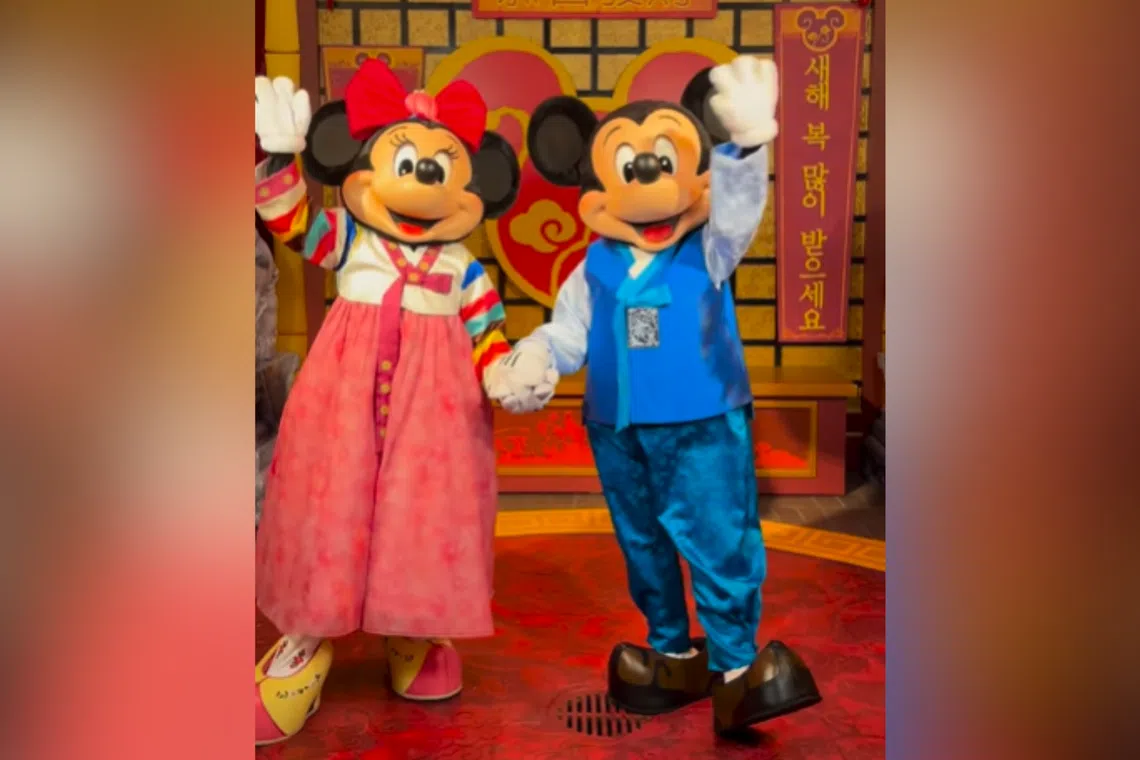Mickey, Minnie in hanbok deliver CNY greetings at Disneyland, set off online comment war in S. Korea
Sign up now: Get ST's newsletters delivered to your inbox

Some criticised Disneyland for “cultural appropriation”, while others claimed the hanbok is of Chinese origin.
PHOTO: SCREENGRAB FROM DISNEYLAND/INSTAGRAM
Follow topic:
SEOUL - Videos of Mickey Mouse and Minnie Mouse dressed in traditional Korean attire, known as hanbok, and delivering Chinese New Year’s greetings at Disneyland in California, have sparked fierce debate online.
The videos show the two iconic Disney characters in hanbok greeting visitors in front of New Year’s greetings written in Korean, Chinese and Vietnamese.
It marked the first time Mickey and Minnie Mouse wore hanbok. Disneyland has typically showcased characters highlighting traditional Chinese New Year elements, such as red lanterns and dragon dances.
Although Lunar New Year is celebrated in many Asian countries, including Korea, China, Singapore, Malaysia and Vietnam, the holiday has widely been referred to as Chinese New Year in the West. The term, not used in Asian countries, stems from Lunar New Year celebrations held in many Chinatowns across the world.
When the video was posted on the amusement park’s official Instagram account last week, many Koreans were thrilled to see the characters dressed in hanbok.
But by the afternoon of Jan 23, the post had received 951 comments, some of which criticised Disneyland for “cultural appropriation”. Others claimed that hanbok is of Chinese origin and that Lunar New Year is a Chinese event.
“Placing Korean and Vietnamese cultures ahead of Chinese culture, having Mickey and Minnie dressed in hanbok, and similar actions that seem to downplay China’s foundational role and profound influence on this holiday are deeply disappointing and regrettable,” one user who used a Chinese flag emoticon remarked.
Similiar comments were also met by users refuting the claims, as well as those expressing dismay at the use of Chinese music while showing Korean hanbok.
Some local experts say this backlash from Chinese users can be attributed to the influence of the Chinese government’s North-east Project, an initiative aimed at integrating historical events and cultural elements
It includes efforts to claim aspects of Korean culture, such as kimchi and hanbok, as part of China’s heritage.
“The North-east Project began as a response to the growing global interest in Korean culture after the 2000s, driven by the anxiety in China over the shifting cultural center of East Asia from China to Korea,” said liberal arts professor Seo Kyung-duk at Sungshin Women’s University.
One representative example is when, two years ago at the Beijing Winter Olympics, members of China’s ethnic minorities were seen wearing hanbok, he explained.
Also, in 2021, the government of Jilin province, located in the north-eastern part of China, designated the methods of making dolsot bibimbap as well as Korean rice cakes as “intangible cultural heritage”. THE KOREA HERALD/ASIA NEWS NETWORK

